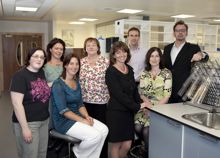2010 Press Releases
13.09.2010
An international team of scientists and physicians led by UCC professor, Louise Kenny, has identified 14 new metabolites that can detect first-time pregnant women’s risk for preeclampsia, a life -threatening condition, that often does not present until the second half of pregnancy.
Currently there is no predictive test for the condition and no cure other than delivery of the baby. The research findings are published today, (13/9/10) in Hypertension: Journal of the American Heart Association.
Preeclampsia is a life-threatening condition characterized by high blood pressure and elevated protein in the urine. The condition is thought to begin in early pregnancy with defective development of the placenta but most often does not present until the second half of pregnancy. Preeclampsia can endanger the lives of both mother and child and is a leading cause of maternal death.
The international team of researchers used a combination of sophisticated emerging technologies and data analysis to detect 14 simple metabolites with high accuracy to predict in early pregnancy which women are at risk of developing preeclampsia in later pregnancy. “Everything we know about this condition suggests women do not become sick and present with preeclampsia until late in pregnancy, but the condition originates in early pregnancy,” said Louise C Kenny, MD, PhD, the study lead and professor of obstetrics and gynecology at the Anú Research Centre, University College Cork. “To develop effective treatment and prevention strategies — our ultimate goal — we need to be able to start treatment in early pregnancy. We need to be able tell who is at risk and who is not.”
Researchers studied women in SCOPE (Screening for Pregnancy Endpoints), an international trial of approximately 7,000 women with first-time pregnancies which aims to predict and prevent the major diseases of late pregnancy.
In the case control study, researchers first discovered and evaluated the detection rate of the test in women at 15 weeks’ gestation with low risk of preeclampsia in Auckland, New Zealand. The 60 fit, healthy, first-time pregnant women (average age 30) later developed preeclampsia. They were matched with a control group of 60 women.
The study’s second phase validated the initial findings in an entirely different group of women in Adelaide, Australia. These women were younger, with an average age of 22-23 and were ethnically more diverse compared to the predominantly Caucasian group in New Zealand. Thirty-nine women subsequently developed preeclampsia later after the early test. There were 40 matched controls.
The researchers are trying to simplify the technology to develop a single blood test for the bedside that will be cheap and readily accessible to hospitals everywhere.
“In the next five years our aim is to develop a simple blood test that will be available to all pregnant women that will detect the risk of preeclampsia in early pregnancy,” said Dr Phil Baker MD, Dean of Medicine and Dentistry at the University of Alberta and co-investigator of the study.
In the United States and in the developed world, preeclampsia affects four percent to five percent of pregnant women, but may reach 10 percent in the developing world. The World Health Organization estimates that from 100,000 to 200,000 women die each year as a direct cause of preeclampsia.
The study was carried out by researchers from University College, Cork, Ireland, University of Manchester UK, University of Auckland, New Zealand, University of Adelaide, Australia and University of Alberta, Canada.
Professor Kenny is a Science Foundation Ireland Principal Investigator and a Health Research Board Ireland Clinician Scientist. The Health Research Board Ireland fund the SCOPE Ireland study. The metabolomic discovery programme is funded by the Wellcome Trust and by Science Foundation Ireland.
Picture: The research team from left; Joanna Teahan Dillon (SCOPE/Baseline Lab Technician), Áine Gallagher (SCOPE/Baseline Midwife), Jackie Kelly (SCOPE Midwife), Dr David O'Leary (SCOPE Lab Technician), Dr David Broadhurst (Senior Postdoctoral Research Scientist in Metabolomics). Front row; Nicolai Murphy (SCOPE Study Coordinator), Professor Louise Kenny (Primary Investigator SCOPE Ireland, Professor of Obstetrics and Consultant Obstetrician and Gynaecologist), Emma Snapes (SCOPE/Baseline Lab Coordinator).
RMcD

